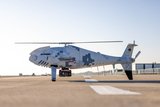Boeing receives $1.6b contract for P-8A Poseidon low-rate initial production
Boeing on Jan. 21 received a $1.6 billion contract from the US Navy for low-rate initial production (LRIP) of the P-8A Poseidon aircraft. The LRIP 1 contract is for six P-8A aircraft, spares, logistics and training devices.
The Navy plans to purchase 117 of the Boeing 737-based P-8A anti-submarine warfare, anti-surface warfare, intelligence, surveillance and reconnaissance aircraft to replace its P-3 fleet. Initial operational capability is planned for 2013.
"Providing these production aircraft to the Navy fleet on schedule is our No. 1 goal," said Chuck Dabundo, Boeing vice president and P-8 program manager. "This is an exciting day for Boeing and the Navy and a testament to the P-8 team's hard work and determination."
"This first production contract represents a significant commitment by the US Navy to recapitalize its force of long-range maritime patrol and reconnaissance aircraft," said Capt. Leon Bacon, P-8A deputy program manager for the Navy. "Ensuring that this capability arrives on schedule and within budget remains our primary objective."
Boeing will begin final assembly of the first LRIP aircraft at its Renton, Wash., facility this summer. The Poseidon team is using a first-in-industry in-line production process that draws on Boeing's Next-Generation 737 production system. All P-8A-unique aircraft modifications will be made in sequence during fabrication and assembly.
"The in-line approach we've incorporated on this military derivative aircraft is already paying the dividends we expected by helping us improve efficiency and reduce costs," said John Pricco, Boeing Commercial Airplanes P-8 program manager.
As part of the US Navy System Development and Demonstration contract awarded to Boeing in 2004, the team is building and testing six flight-test and two ground-test aircraft. The first three flight-test planes, T1, T2 and T3, are completing testing at Naval Air Station Patuxent River, Md. The program's static test plane, S1, recently completed its test program, which began in May 2009; S2, the fatigue test plane, will begin testing later this year.
A derivative of the Next-Generation 737-800, the Poseidon is built by a Boeing-led industry team that includes CFM International, Northrop Grumman, Raytheon, Spirit AeroSystems, BAE Systems and GE Aviation.
Source: Boeing
More from Digital Battlespace
-
![Push for greater use of open source data, says senior British officer]()
Push for greater use of open source data, says senior British officer
The huge amount of open source data available may not carry the weight of secret sources but it does carry substantial value, according to speakers at Defence IQ C4ISR Global conference in London.
-
![Jacobs wins MoD cyber-security support contract]()
Jacobs wins MoD cyber-security support contract
The deal with Jacobs will run until November 2027 and will see the company deliver a range of digital and IT specialist professional services to Defence Digital.
-
![Orbit upgrades two multi-purpose terminals and carries out land testing]()
Orbit upgrades two multi-purpose terminals and carries out land testing
The communications company has upgraded two of its Beyond Line-of-Sight Multi-Purpose Terminals (MBTs) by introducing advancements in satellite communication technology and AI-driven maintenance capabilities.
-
![Norway to receive maritime surveillance satellite data from Kongsberg]()
Norway to receive maritime surveillance satellite data from Kongsberg
Norway's Kongsberg Defence and Aerospace has announced that its subsidiary Kongsberg NanoAvionics will produce three satellites and launch them in 2025.
-
![First South Korean 425 Project observation satellite launched]()
First South Korean 425 Project observation satellite launched
In 2015, South Korea named a consortium of Korea Aerospace Industries (KAI) and Hanwha Systems, along with Thales Alenia Space providing the SAR payload derived from its HE-R1000 product, as preferred bidder to develop new Korea 425 Project reconnaissance satellites.
-
![German military introduces central command and new cyber branch]()
German military introduces central command and new cyber branch
The German defence minister claimed the reforms would mean the 2025 military budget would require an additional €6.5 billion (US$7 billion).

























